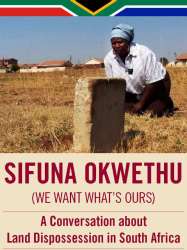A Brother with Perfect Timing est un film
A Brother with Perfect Timing (1987)

Si vous aimez ce film, faites-le savoir !
- Infos
- Casting
- Infos techniques
- Photos
- Vidéos
- Passages TV
- Citations
- Personnages
- Musique
- Récompenses
Durée 1h30
A Brother With Perfect Timing is a 1987 documentary, directed by Chris Austin, about musician Abdullah Ibrahim and his struggle for freedom with apartheid in South Africa.
^ Rawls, John. Southern Africa Political & Economic Monthly, Volume 9. Southern African Political Economy Series (SAPES) Publications Project, 1995, pp. 11-12.
Synopsis
The documentary includes a live performance by Ibrahim and discussions about two of his compositions, "Anthem for a New Nation" and "Mannenberg".Commentaires
Postez un commentaire :
Suggestions de films similaires à A Brother with Perfect Timing
Il y a 11131 films qui ont les mêmes thèmes (dont 37 films qui ont les mêmes 7 thèmes que A Brother with Perfect Timing), pour avoir au final 70 suggestions de films similaires.Si vous avez aimé A Brother with Perfect Timing, vous aimerez sûrement les films similaires suivants :

Death of Apartheid (1995)
, 50minutesRéalisé par Mick Gold
Origine Royaume-uni
Genres Documentaire
Thèmes Afrique post-coloniale, Le racisme, Documentaire sur la discrimination, Documentaire sur le droit, Documentaire sur une personnalité, Documentaire sur la politique, Politique
Note66%






The Notebooks of Memory (2008)
, 53minutesRéalisé par Anne Aghion
Origine France
Thèmes Afrique post-coloniale, Le racisme, Documentaire sur la discrimination, Documentaire sur le droit, Documentaire sur la guerre, Documentaire historique, Documentaire sur une personnalité, Documentaire sur la politique, Politique
Anne Aghion's third film in her Rwanda series concentrates on the local citizen-judges' tribunals, where they must weigh survivor accounts of the genocide massacres against the perpetrators' testimony.

Apartheid Did Not Die (1998)
, 51minutesRéalisé par John Pilger
Genres Documentaire
Thèmes Afrique post-coloniale, Le racisme, Documentaire sur la discrimination, Documentaire sur le droit, Documentaire sur une personnalité, Documentaire sur la politique, Politique
Acteurs John Pilger
Note68%






Origine Etats-Unis
Genres Documentaire
Thèmes Afrique post-coloniale, Le racisme, Documentaire sur la discrimination, Documentaire sur le droit, Documentaire sur une personnalité, Documentaire sur la politique, Politique
In the 1950s South Africans realized that their freedom struggle had to be built in four arenas of action: mass action, underground organization, armed struggle, and international mobilization. Have You Heard From Johannesburg takes viewers inside that last arena, the movement to mobilize worldwide citizen action to isolate the apartheid regime. Inspired by the courage and suffering of South Africa’s people as they fought back against the violence and oppression of racism, foreign solidarity groups, in cooperation with exiled South Africans, took up the anti-apartheid cause. Working against heavy odds, in a climate of apathy or even support for the governments of Hendrik Verwoerd, John Vorster and P.W. Botha, campaigners challenged their governments and powerful corporations in the West to face up to the immorality of their collaboration with apartheid.
 , 54minutes
, 54minutesRéalisé par Anne Aghion
Thèmes Afrique post-coloniale, Le racisme, Documentaire sur la discrimination, Documentaire sur le droit, Documentaire sur la guerre, Documentaire historique, Documentaire sur une personnalité, Documentaire sur la politique, Politique
Note70%





Set in Rwanda, Anne Aghion, the director, interviews a genocide offender who has been released back into his community, and the victims of the genocide. The film follows how at first, the coexistence between the people who instigated the genocide and the victimized people is unbearable. Many of the victims feel rage toward their former oppressors. But gradually, the victims and oppressors start talking to the camera, and then to each other as they start the difficult task of living with each other. The documentary portrays how the people's spirits cannot be crushed by the Rwandan Genocide, the 1994 mass killing of hundreds of thousands of Rwanda's minority Tutsis and the moderates of its Hutu majority by the Interahamwe and the Impuzamugambi.
 , 1h20
, 1h20Réalisé par Roger Spottiswoode
Origine Etats-Unis
Genres Documentaire
Thèmes Afrique post-coloniale, Le racisme, Religion, Le terrorisme, Documentaire sur la discrimination, Documentaire sur le droit, Documentaire sur la guerre, Documentaire historique, Documentaire sur une personnalité, Documentaire sur la politique, Documentaire sur la religion, Politique, Religion juive
Note71%






My Song Goes Forth (1937)
, 33minutesOrigine Royaume-uni
Thèmes Afrique post-coloniale, Le racisme, Documentaire sur la discrimination, Documentaire sur le droit, Documentaire sur une personnalité, Documentaire sur la politique, Politique
Acteurs Paul Robeson
The advance publicity booklet on the film when it was entitled "Africa Sings", touted it as showing "what the white man achieved for himself" and "what he has done for he natives." "Africa Sings" was one of the first documentary films from South Africa to take a look at the lives of South Africans of all races. There are images of location life, schools and colleges, and a cross-section of occupations, from mine-workers to road-gangs, school-teachers to house- servants, waiters to cane-cutters. Mainstream reviewers gave the documentary a tepid response; the London Daily Worker thought it was too bland to serve a staunch liberationist purpose.

Sifuna Okwethu (2011)
Origine Etats-Unis
Genres Documentaire
Thèmes Afrique post-coloniale, Le racisme, Documentaire sur la discrimination, Documentaire sur le droit, Documentaire sur une personnalité, Documentaire sur la politique, Politique
The film tells the story of both sides claiming the same land as their own. The Ndolilas family’s land was taken by the apartheid government in the 1970s without compensation, and ever since then they have been on a quest to get it back. Standing in their way are working class black homeowners who purchased portions of the Ndolila's land during apartheid. For the homeowners, the land and houses they have legally purchased are a reward for their hard work and the fulfillment of their hopes and dreams for a better life in the new democracy. For the Ndolilas, the land is part of their family legacy and hence deeply intertwined with their identity. Both sides have a legitimate right to the land, and the film encourages viewers to think about whose rights should prevail.

Motherland (2010)
, 1h58Réalisé par Owen 'Alik Shahadah
Origine Etats-Unis
Genres Documentaire
Thèmes Afrique post-coloniale, Esclavagisme, Le racisme, Documentaire sur la discrimination, Documentaire sur le droit, Documentaire historique, Documentaire sur une personnalité, Documentaire sur la politique, Politique
Acteurs Harry Belafonte, Abdulkadir Ahmed Said
Note82%





Motherland is an epic documentary about the African continent from Ancient Egypt to the present. It is an overview of African history and contemporary issues but with the African people at the centre of the story. It is one of the first Pan-African features to be made.

L'Afrique en morceaux (2000)
, 1h44Origine France
Genres Documentaire
Thèmes Afrique post-coloniale, Le racisme, Documentaire sur la discrimination, Documentaire sur le droit, Documentaire sur la guerre, Documentaire historique, Documentaire sur une personnalité, Documentaire sur la politique, Politique
Avril 1994 : génocide au Rwanda. 800 000 morts. Une catastrophe qui entraînera des déséquilibres dans toute la région. L’Afrique des Grands Lacs finit le siècle dans un bain de sang. Ce documentaire montre les intrigues, les coups d’éclat, les trahisons, les vengeances qui ont prévalu durant ces années avec pour seuls objectifs de conserver ou d’agrandir sa zone d’influence. C’est ainsi que cette décennie a vu s’envoler peu à peu tous les espoirs des populations. Espoirs d’une Afrique maîtresse de son destin, d’une autosuffisance alimentaire, de l’arrêt des conflits interethniques…
 Connexion
Connexion